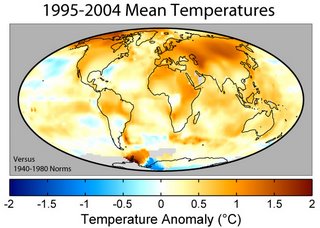 Global warming is one of the greatest challenges facing us today. Movement towards solutions has been blocked by global-warming-deniers such as Sen. James M. Inhofe (R-Okla.) who has chaired the Senate Environment and Public Works Committee and has referred to global warming as a hoax. However, change is underway not only as a result of the Democratic successes in the 2006 mid-term elections but also because corporate America is becoming convinced it is in their interest to acknowledge and address the issues. According to Talking Points Memo, “One of the least commented upon aspects of the so-called debate on global warming is the extent to which the business community has for some time now been to the left of the Republican Party on the science of climate change and even, to a certain extent, on the potential political solutions to the problem.”
Global warming is one of the greatest challenges facing us today. Movement towards solutions has been blocked by global-warming-deniers such as Sen. James M. Inhofe (R-Okla.) who has chaired the Senate Environment and Public Works Committee and has referred to global warming as a hoax. However, change is underway not only as a result of the Democratic successes in the 2006 mid-term elections but also because corporate America is becoming convinced it is in their interest to acknowledge and address the issues. According to Talking Points Memo, “One of the least commented upon aspects of the so-called debate on global warming is the extent to which the business community has for some time now been to the left of the Republican Party on the science of climate change and even, to a certain extent, on the potential political solutions to the problem.”This is from today’s Washington Post:
You may read the whole article here.While the political debate over global warming continues, top executives at many of the nation's largest energy companies have accepted the scientific consensus about climate change and see federal regulation to cut greenhouse gas emissions as inevitable.
The Democratic takeover of Congress makes it more likely that the federal government will attempt to regulate emissions. The companies have been hiring new lobbyists who they hope can help fashion a national approach that would avert a patchwork of state plans now in the works. They are also working to change some company practices in anticipation of the regulation.
"We have to deal with greenhouse gases," John Hofmeister, president of Shell Oil Co., said in a recent speech at the National Press Club. "From Shell's point of view, the debate is over. When 98 percent of scientists agree, who is Shell to say, 'Let's debate the science'?"
Hofmeister and other top energy company leaders, such as Duke Energy Corp.'s chief executive, James E. Rogers, back a proposal that would cap greenhouse gas emissions and allow firms to trade their quotas.
Paul M. Anderson, Duke Energy's chairman and a member of the president's Council of Advisors on Science and Technology, favors a tax on emissions of carbon dioxide, the most prevalent greenhouse gas. His firm is the nation's third-largest burner of coal.
Exxon Mobil Corp., the highest-profile corporate skeptic about global warming, said in September that it was considering ending its funding of a think tank that has sought to cast doubts on climate change. And on Nov. 2, the company announced that it will contribute more than $1.25 million to a European Union study on how to store carbon dioxide in natural gas fields in the Norwegian North Sea, Algeria and Germany.
These changes come as Democratic leaders prepare to take over key committees on Capitol Hill. Sen. Barbara Boxer (Calif.), who calls global warming "the greatest challenge of our generation," will take the place of Sen. James M. Inhofe (R-Okla.) as chairman of the Senate Environment and Public Works Committee. Inhofe refers to global warming as a "hoax."
***
One reason companies are turning to Congress is to avert the multiplicity of regulations being drafted by various state governments. The Regional Greenhouse Gas Initiative, a group of seven Northeastern states, is moving ahead with a proposed system that would set a ceiling on greenhouse gas emissions, issue allowances to companies, and allow firms to trade those allowances to comply with regulations.
California is drawing up its program. Other states are also contemplating limits. Even the city of Boulder, Colo., has adopted its own plan -- a carbon tax based on electricity use.
"We cannot deal with 50 different policies," said Shell's Hofmeister. "We need a national approach to greenhouse gases."
No comments:
Post a Comment